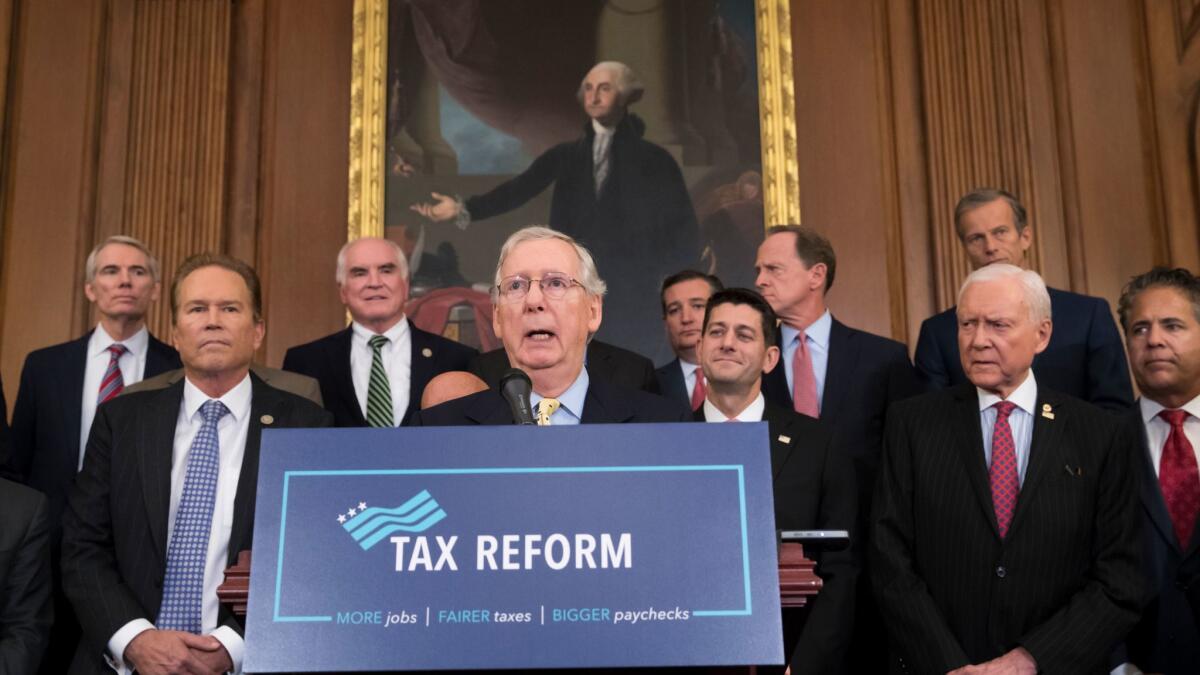Column: In 2017, Congress abandoned economic logic, and you could start paying in 2018

- Share via
In a recent interview, the conservative economist Stephen Moore — an advisor to and unapologetic fan of President Trump — explained the policy rationale of the tax cut bills that were then making their way through a Republican-dominated Congress.
“It’s death to Democrats,” he told Bloomberg’s Sahil Kapur. “They go after state and local taxes, which weakens public employee unions. They go after university endowments, and universities have become playpens of the left.”
The key element missing from this assessment by an economist? Economics. Nonetheless, Republicans have marketed the tax cuts as keys to economic growth — and that’s why cuts have elicited widespread skepticism from budget analysts.
Past changes in tax rates have had no large clear effect on economic growth.
— Congressional Research Service, 2014
It’s not only because there’s virtually no historical evidence that tax cuts are tied to economic growth. It’s that even if one believes the linkage exists, now would be the wrong time to cut taxes. The economy is growing strongly and unemployment is falling fast. Moore himself, in an email exchange with me in October, described the economy as “sizzling hot.”
If that’s so, then the tax cuts could lead the economy to overheat, possibly into a recessionary meltdown. The economy was on a high through most of 2017, but the hangover in 2018 could be epic.
The economy was on a high through most of 2017, but the hangover in 2018 could be epic.
In either case, the consequences may well be dire for the middle class. Pressure will mount to reduce spending. Under Republican regimes, that means cutting Social Security and Medicare benefits. Some Republican officeholders already are talking that way, including Sen. Marco Rubio of Florida, who told a Washington forum earlier this month that reducing spending means “instituting structural changes to Social Security and Medicare for the future.”
Medicare was threatened with an automatic annual budget cut of $25 billion. That’s the result of a law known as PAYGO (for “pay as you go”), which requires Congress to offset any increase in the federal deficit with spending cuts. The law limits Medicare cuts to 4% of its budget per year, or $25 billion of its $625-billion budget. Congress voted to waive the PAYGO provisions for 2018 so President Trump could sign the tax bill Dec. 22, but they may still kick in for later years. That could result in fewer services, higher premiums for some seniors, or cuts in reimbursements to doctors and hospitals that might translate into less access to professional services for Medicare enrollees.
Residents of California and other high-service, high-tax states will detect the impact of the tax bill as soon as they calculate their taxes for 2018, when the deductibility of state and local taxes will be limited to $10,000. According to a survey by my colleague Jon Schleuss, more than 30% of residents deducted state and local taxes in 12 of the 14 California congressional districts represented by Republicans, and in seven of the districts the ratio was 40% or higher.
None of this will matter if the tax cuts produce an economic surge, as their supporters predict. They also assert that the corporate tax cuts at the center of the tax plan will translate into higher wages, as businesses redirected their tax savings to their workforce. No evidence exists for either claim, but there is considerable evidence to contradict them.
Following a study of changes in tax rates dating back to 1950, the Congressional Research Service reported in 2014 that “past changes in tax rates have had no large clear effect on economic growth.” Bruce Bartlett, who confessed in a recent op-ed to having “helped create the GOP tax myth” that cuts equal growth as a member of President Reagan’s domestic policy team, observed that economic growth actually was higher in the 1970s than after Reagan’s tax cut in 1981.
In times like this, Washington should be using the revenues flowing into the Treasury to reduce the deficit and pay down the national debt — not add to the deficit and setting up a surge in borrowing. That will leave the government with little ammunition to combat the next recession, “unless previously unimaginable and politically intolerable deficits, tax increases or spending cuts suddenly become acceptable,” argues Stan Collender, a former staff member of the House and Senate budget committees.
Moreover, he says, “Washington’s ability to invest in anything new that will improve the economy (think infrastructure, education and medical research) will be far less.”
The Republican tax plans, in other words, are mortgaging the future. And the future starts on Jan. 1.
Keep up to date with Michael Hiltzik. Follow @hiltzikm on Twitter, see his Facebook page, or email michael.hiltzik@latimes.com.
Return to Michael Hiltzik’s blog.
More to Read
Get the L.A. Times Politics newsletter
Deeply reported insights into legislation, politics and policy from Sacramento, Washington and beyond. In your inbox twice per week.
You may occasionally receive promotional content from the Los Angeles Times.









